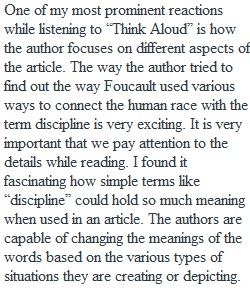


Q For this writing response, you will need to complete the following 6 steps: 1 - Watch my video that demonstrates the "Think Aloud" reading technique: 2 - Do a Think Aloud (does not require recording) for the article/handout titled "Foucault Power Reading."Download "Foucault Power Reading." 3 - In your 15-20 sentence writing response, write about 2 reactions you had while watching me do my Think Aloud on the sample article. 4 - Write about 2 things in your response that you noticed yourself doing during your Think Aloud. 5 - In addition to writing those 2 things in your response, you also need to provide 1 passage that proved difficult and discuss how you approached it in your Think Aloud. What did you do to try to understand it? Provide a short answer in your post. 6 - Choose a key point or passage that stood out to you, in the article, and explain why you felt it was important and/or why you chose it. Once you have completed these 6 steps, you are finished with the assignment. The assignment will be typed and submitted in the text box below. This assignment is due no later than 11:59 p.m., Sunday, 1/22. PreviousNext
View Related Questions